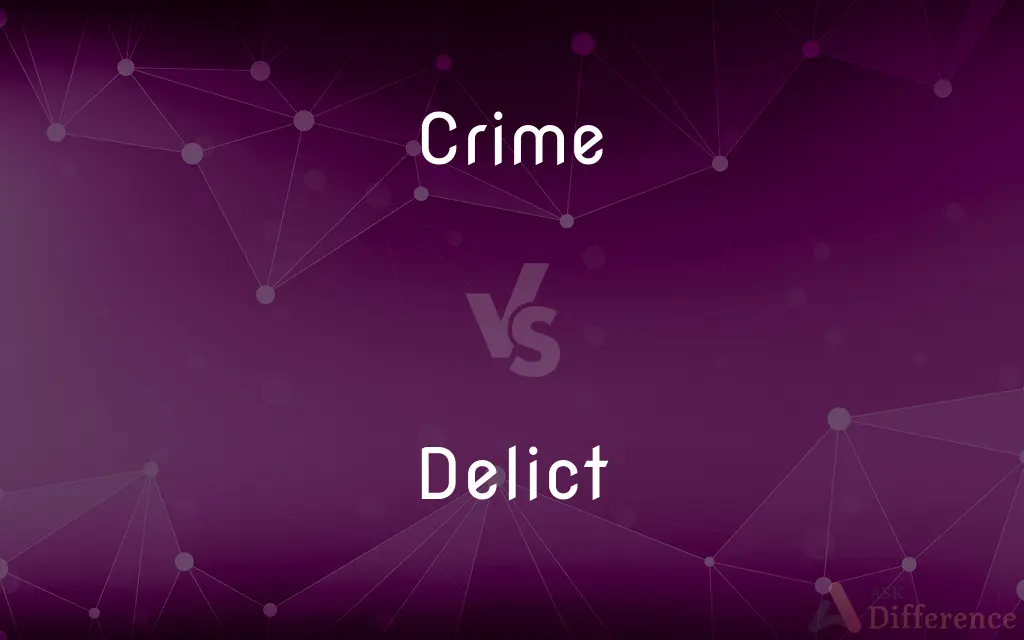Crime vs. Delict — What's the Difference?
Edited by Tayyaba Rehman — By Urooj Arif — Updated on March 28, 2024
Crime refers to actions that violate statutory law and are punishable by the state, while delict pertains to civil wrongs causing harm to individuals, remediable through compensation.

Difference Between Crime and Delict
Table of Contents
ADVERTISEMENT
Key Differences
Crime encompasses acts like theft or murder that contravene laws established by a government, leading to prosecution and punishment such as imprisonment or fines. Whereas delict involves private wrongs or injuries suffered by individuals, such as negligence or defamation, which result in civil litigation aimed at compensating the victim.
While crimes are prosecuted by the state to maintain public order and safety, delicts are pursued by individuals or entities seeking redress for personal harm or loss, emphasizing the distinction in their legal handling and societal impact.
In the context of crime, the emphasis is on deterrence, punishment, and societal protection, reflecting its public law nature. On the other hand, delict focuses on compensating the victim for the harm caused, rooted in private law principles.
Crimes are categorized based on their severity into felonies and misdemeanors in many jurisdictions, with varying degrees of punishment. Delicts, however, are primarily concerned with the extent of harm and the appropriate compensation, without such classification.
The legal processes involved also differ; crimes undergo criminal trials with the possibility of incarceration, whereas delicts lead to civil lawsuits where the resolution often involves monetary compensation.
ADVERTISEMENT
Comparison Chart
Definition
Violation of statutory law punishable by the state.
Civil wrong causing harm to an individual, remediable through compensation.
Legal Framework
Public law
Private law
Primary Objective
Deterrence, punishment, and societal protection.
Compensation for the victim.
Prosecution
Conducted by the state.
Initiated by the individual harmed.
Typical Outcomes
Imprisonment, fines, or community service.
Monetary compensation or restitution.
Compare with Definitions
Crime
A crime is an act against the law, such as burglary.
The burglary was investigated as a crime due to illegal entry and theft.
Delict
Delict law covers a wide range of personal injuries.
Personal injury claims for negligence in a store fall under delict.
Crime
Crimes can be classified into felonies and misdemeanors.
Felonies include serious crimes like armed robbery.
Delict
Delict involves a wrongful act causing harm to someone, like defamation.
The celebrity sued for defamation, claiming the article was a delict.
Crime
The prosecution of crimes serves public interest and safety.
Prosecuting violent crimes helps ensure community safety.
Delict
Delicts are addressed through civil lawsuits for damages.
After the car accident, the victim's family filed a delict claim for compensation.
Crime
Crimes involve actions punishable by the state, like vandalism.
Vandalism of public property is a crime that can lead to fines.
Delict
In delict cases, the focus is on compensating the victim.
The court awarded damages in the delict case to cover medical expenses.
Crime
Criminal acts require intent or negligence, such as manslaughter.
Manslaughter is treated as a crime when negligence results in death.
Delict
The resolution of delicts often involves monetary settlements.
The company agreed to a monetary settlement in the delict case involving workplace injury.
Crime
An act committed in violation of law where the consequence of conviction by a court is punishment, especially where the punishment is a serious one such as imprisonment.
Delict
A wrongful act under law, such as a tort or a criminal offense.
Crime
Unlawful activity
Statistics relating to violent crime.
Delict
Delict (from Latin dēlictum, past participle of dēlinquere ‘to be at fault, offend’) is a term in civil and mixed law jurisdictions whose exact meaning varies from jurisdiction to jurisdiction but is always centred on the notion of wrongful conduct. In Scots and Roman Dutch law, it always refers to a tort, which can be defined as a civil wrong consisting of an intentional or negligent breach of duty of care that inflicts loss or harm and which triggers legal liability for the wrongdoer.
Crime
Any great wickedness or sin; iniquity.
No crime was thine, if 'tis no crime to love.
Delict
A wrongful act, analogous to a tort in common law.
Crime
In ordinary language, a crime is an unlawful act punishable by a state or other authority. The term crime does not, in modern criminal law, have any simple and universally accepted definition, though statutory definitions have been provided for certain purposes.
Delict
(legal) The branch of law dealing in delicts.
Crime
A serious offense, especially one in violation of morality.
Delict
An offense or transgression against law; (Scots Law) an offense of a lesser degree; a misdemeanor.
Every regulation of the civil code necessarily implies a delict in the event of its violation.
Crime
An unjust, senseless, or disgraceful act or condition
It's a crime to waste all that paper.
Crime
(countable) A specific act committed in violation of the law.
Crime
(countable) Any great sin or wickedness; iniquity.
Crime
That which occasions crime.
Crime
(uncountable) Criminal acts collectively.
Crime
(uncountable) The habit or practice of committing crimes.
Crime doesn’t pay.
Crime
To subject to disciplinary punishment.
Crime
(nonce word) To commit crime.
Crime
Any violation of law, either divine or human; an omission of a duty commanded, or the commission of an act forbidden by law.
Crime
Gross violation of human law, in distinction from a misdemeanor or trespass, or other slight offense. Hence, also, any aggravated offense against morality or the public welfare; any outrage or great wrong.
Crime
That which occasion crime.
The tree of life, the crime of our first father's fall.
Crime
(criminal law) an act punishable by law; usually considered an evil act;
A long record of crimes
Crime
An evil act not necessarily punishable by law;
Crimes of the heart
Common Curiosities
Who prosecutes crimes?
Crimes are prosecuted by governmental authorities.
How are crimes classified?
Crimes are often classified into felonies and misdemeanors based on severity.
What is the role of intent in delict?
Intent or negligence can be factors in determining liability in delict cases.
What is considered a crime?
Any act that violates statutory law and is punishable by the state.
What are common punishments for crimes?
Punishments include imprisonment, fines, or community service.
Can a single act be both a crime and a delict?
Yes, some acts can lead to both criminal prosecution and civil litigation for damages.
What constitutes a delict?
A delict is a civil wrong or injury caused to an individual, requiring compensation.
How are delicts resolved?
Delicts are usually resolved through civil lawsuits and monetary compensation.
Can the same incident give rise to both a crime and a delict?
Yes, incidents like a car accident can result in both criminal charges and a delict claim for damages.
How does the burden of proof differ between crime and delict cases?
The burden of proof is typically higher in criminal cases (beyond a reasonable doubt) than in civil delict cases (preponderance of the evidence).
Can a victim sue for a delict without pressing criminal charges?
Yes, a victim can pursue a delict claim independently of any criminal prosecution.
Can a corporation commit a delict?
Yes, corporations can be liable for delicts if their actions cause harm.
How do societal views on crime and delict differ?
Society often views crimes as offenses against public order, while delicts are seen as personal wrongs needing rectification.
Are delicts public or private matters?
Delicts are considered private matters between the parties involved.
Do crime and delict have different legal remedies?
Yes, crimes focus on punishment and deterrence, while delicts focus on compensating the victim.
Share Your Discovery

Previous Comparison
Encouragement vs. Encourage
Next Comparison
Panic vs. FranticAuthor Spotlight
Written by
Urooj ArifUrooj is a skilled content writer at Ask Difference, known for her exceptional ability to simplify complex topics into engaging and informative content. With a passion for research and a flair for clear, concise writing, she consistently delivers articles that resonate with our diverse audience.
Edited by
Tayyaba RehmanTayyaba Rehman is a distinguished writer, currently serving as a primary contributor to askdifference.com. As a researcher in semantics and etymology, Tayyaba's passion for the complexity of languages and their distinctions has found a perfect home on the platform. Tayyaba delves into the intricacies of language, distinguishing between commonly confused words and phrases, thereby providing clarity for readers worldwide.
















































